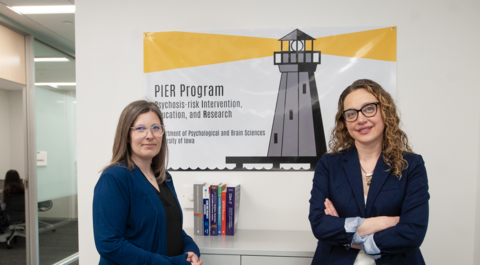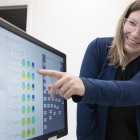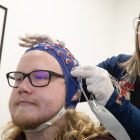By Charlotte Brookins
Department of Psychological and Brain Sciences assistant professors Amanda McCleery and Bengi Baran, trained respectively in clinical psychology and neuroscience, have launched a program to help anyone in the University of Iowa community experiencing negative mental health symptoms.
The initiative is called the Psychosis-Risk Intervention, Education, and Research Program, also known as PIER. The program is designed to help people aged 12-45 catch symptoms of psychosis early, which can include unusual changes in thoughts, perception, mood, or behavior.
Prior to coming to the University of Iowa, McCleery and Baran both spent time in recovery-oriented youth mental health programs, where they worked with adolescents and young adults experiencing early warning signs of psychosis.
“All too often the subtle early warning signs of psychosis are easily missed, and individuals only come to clinical attention once there is a psychiatric crisis, which may involve law enforcement or involuntary treatment,” McCleery explains.
But PIER aims to intervene before a full mental health crisis is experienced.

“An added benefit of early detection research programs are the outreach and educational activities that serve to increase awareness of early warning signs of psychosis and the availability of services, which can help avert psychiatric crises, dramatically reduce the duration of untreated psychosis in our community, and improve access to high quality mental health care.”
PIER offers several services, including evidence-based diagnostic assessments and continued monitoring of symptoms over time as part of a research study.
“We provide feedback to PIER participants, their family, and treatment providers about the assessment results, rapid referral to psychiatric services and community programs, and recommendations for follow-up care and strategies that can help support successful adaptation to mental health challenges,” McCleery explains.
PIER does not charge for its services—in fact, given that the program is also a research project, patients are compensated for their time in the program. The goal is to learn more about the predictors of long-term outcomes of psychosis, especially for younger patients.
Although the program has been around for less than a year, researchers are receiving positive feedback from community members.
“Participants have told us that simply having the opportunity to talk about their experiences, and learning that others have had similar experiences, in a supportive setting through the assessment process has been very helpful to them,” McCleery added.
Those going through early stages of psychosis are not alone, and resources are available to help.
To learn more about the PIER program, visit the website or email pbs-pier@uiowa.edu.

|

|

|